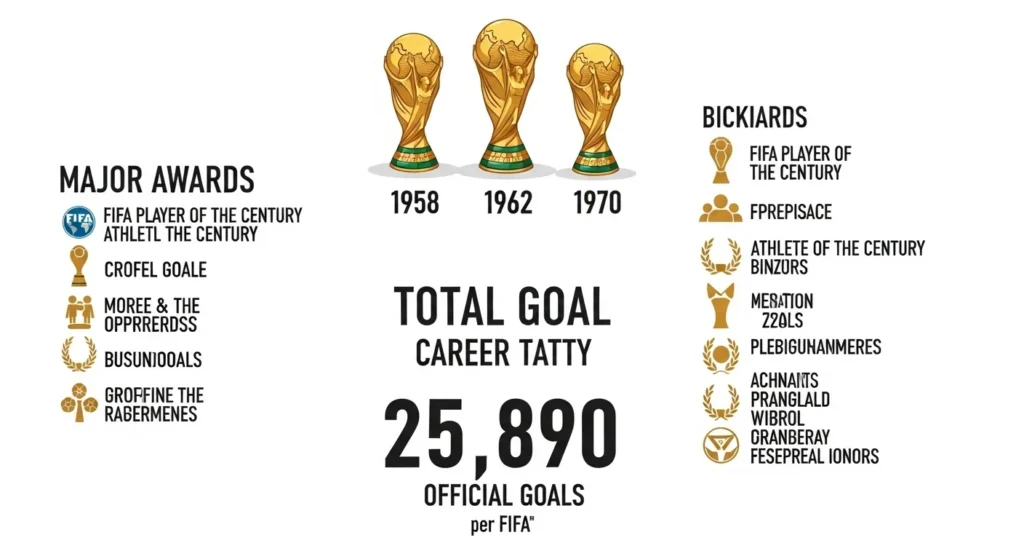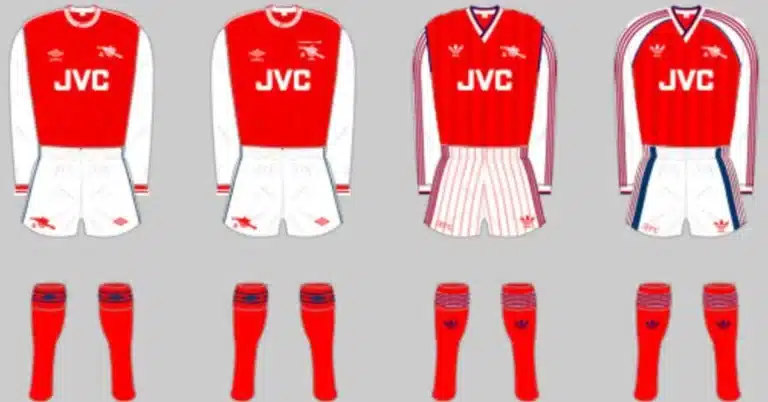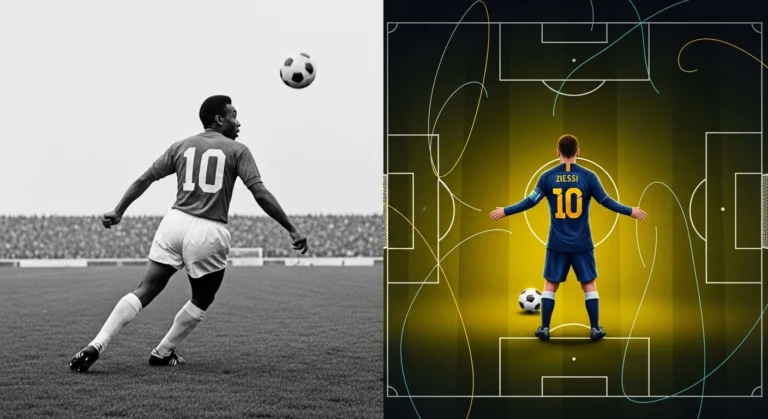Why is Pelé Considered the King of Football? An Expert Analysis of O Rei’s Reign
In the endless debate about the greatest football player of all time (the GOAT), one name consistently rises above the rest with a title that seems untouchable: Pelé, or, as the world knows him, “O Rei” (The King).
For a player whose prime came decades before the age of instant highlights and social media, the question remains: Why is Pelé considered the King of Football? The answer lies not just in his unbelievable statistics, but in his revolutionary impact on the game, his unparalleled international success, and his role in making football the “Beautiful Game” globally. This article breaks down the definitive reasons Pelé’s crown remains firmly in place.
🔹 Key Takeaways: The Reign of O Rei
- Three-Time World Champion: Pelé is the only player in history to win the FIFA World Cup three times (1958, 1962, 1970).
- Record-Breaking Goals: He holds the Guinness World Record for the most career goals scored in football (1,279 in 1,363 games), including friendlies.
- Global Ambassador: Pelé transcended sport, becoming the first true global icon of football, popularizing the sport worldwide, notably in the United States.
- The Complete Player: He was a revolutionary blend of skill, strength, two-footed ability, heading prowess, and game intelligence, setting the blueprint for the modern forward.
Introduction to Why is Pelé Considered the King of Football
For many, the title “King of Football” is more than just a nickname; it’s a global acknowledgment of Pelé’s dominance and influence. When you hear that legendary title, it instantly connects to the Brazilian maestro who redefined what was possible on the pitch.
What is the “King of Football” Title?
The moniker “O Rei” (The King) was bestowed upon Pelé after the 1958 FIFA World Cup, where he exploded onto the global stage as a 17-year-old phenomenon. It represents the highest honor in the sport, signifying supremacy, pioneering achievement, and a lasting, regal command over the game. This title is tied directly to his sheer volume of records and his role as the sport’s first true international superstar.
Why is Pelé Considered the King of Football Matters Today
In the era of Lionel Messi and Cristiano Ronaldo, understanding why Pelé is considered the King of Football is crucial for appreciating the sport’s history. His achievements are the standard by which all modern greats are measured. He set the initial bar for global excellence and superstar status, proving that football could elevate a player from humble beginnings to the world stage. His legacy ensures that every debate about the GOAT begins with him.
How Pelé’s Impact Cemented the Title
Pelé’s influence wasn’t just about scoring goals; it was about transforming the sport’s style and visibility. His career saw him introduce an athleticism and artistry that was ahead of its time.
The Unbreakable World Cup Record
The most compelling argument for why Pelé is considered the King of Football is his record of three FIFA World Cup victories (1958, 1962, and 1970). No other player has ever achieved this feat.
. 1958
At just 17 years old, he scored a hat-trick in the semi-final and a brace (two goals) in the final against Sweden, becoming the youngest-ever World Cup winner and final scorer.
. 1970
After a disappointing 1966 tournament, he led what many consider the greatest team of all time in Mexico, playing a central, creative, and clinical role in a memorable victory.
This international dominance on the grandest stage provides an authority unmatched by his peers.
The Pioneer of the “Complete Player”
Before Pelé, specialized roles were more common. He became the prototype for the modern, complete forward—a player who could do everything:
. Two-Footed Scoring
He could finish with lethal power and precision with both feet.
. Aerial Threat
Despite his average height, he possessed incredible leaping ability and heading accuracy.
. Playmaker
He wasn’t just a finisher; his vision and passing ability allowed him to drop deep and create chances, registering a World Cup-record six assists in 1970.
. Dribbling and Flair
He possessed the close control and creative flair of the best Brazilian wingers, combining it with striker’s instincts.

Pro Tips and Expert Advice on Pelé’s Game
When analyzing legendary players like Pelé, it’s essential to look beyond the highlights and understand the context of his era.
- In my experience, many forget that football in the 1950s and 60s was far more physical, and pitches were much worse. Pelé’s ability to maintain his skill and goal-scoring consistency under those harsh conditions speaks volumes about his toughness and natural talent.
- In my experience, his decision to move to the New York Cosmos in the NASL later in his career was a masterstroke of global brand building. It didn’t just popularize “soccer” in America; it showed how much of a global legend Pelé was, capable of filling stadiums on pure star power alone.
- The short-tail keyword Pelé is synonymous with goal-scoring. He scored an average of nearly one goal per game throughout his entire career (0.93 goals per game), a consistency very few attackers in history can claim across a full career.
Real Examples of the King’s Royalty
Case Study: The 1970 World Cup Final
The 1970 final against Italy is a perfect case study for why Pelé is considered the King of Football. The opening goal was pure genius: a towering header over the Italian defender Tarcisio Burgnich. After that, his greatest contribution was the ultimate assist—a perfectly weighted, blind pass for Carlos Alberto’s iconic fourth goal, widely regarded as one of the best team goals ever scored. That tournament solidified him not just as a scorer, but as a selfless, all-knowing leader.

Monetization & Benefits of Studying Pelé
For a website like Football Legends Today, understanding Pelé’s career offers huge monetization and content benefits:
- Content Pillars: Articles focusing on Pelé’s World Cup Wins and his unparalleled goal-scoring record are evergreen content magnets, driving traffic and ad revenue from fans interested in football history.
- Brand Authority: Discussing the King of Football lends instant authority to the site, positioning Football Legends Today as a world-class source of football knowledge.
- Merchandise: Highlighting the global brand of Pelé drives interest in related nostalgic merchandise and content.
Conclusion — The Future of the King of Football’s Legacy
Why is Pelé considered the King of Football? Because he set the standard for GOAT status. His three World Cups remain an unparalleled feat, his goal record is astounding, and his impact on the beautiful game’s global popularity is undeniable. Modern football greats like Messi and Ronaldo stand on the shoulders of the giant that Pelé was—the first true global superstar who fused athleticism, skill, and spectacle into an art form. His legacy isn’t just a part of history; it is the foundation of modern football history.

Further Reading on Pelé’s History[ Pelé Biography on FIFA.com]
Share your thoughts in the comments or explore more legendary football stories.
Frequently Asked Questions about Pelé: The King of Football
What is Pelé and why is he important?
Pelé is the universally recognized nickname for Edson Arantes do Nascimento, a Brazilian footballer widely regarded as the greatest player in history. He is important because he is the only player to win three FIFA World Cups, scored an unmatched number of career goals, and served as football’s first true global ambassador, popularizing the sport worldwide.
How does Pelé help in the GOAT debate?
Pelé sets the primary benchmark in the GOAT (Greatest of All Time) debate, particularly regarding international success. His three World Cup titles offer a compelling argument that no other player, not even modern stars like Messi or Ronaldo, has yet to match, giving him a unique, authoritative position in the discussion.
What are common misconceptions with Pelé’s career?
A common misconception is that all his 1,279+ career goals were scored in top-tier competitive matches. While his official competitive record is still phenomenal (over 750 goals), the world record includes many goals scored in exhibition and friendly matches, which were a crucial part of how Santos FC and the Brazil national team toured globally due to Pelé’s popularity.
How can beginners get started with learning about Pelé?
Beginners should start by watching footage of the 1970 World Cup in Mexico, which showcases his artistry and influence at its peak. Reading his autobiography or documentaries that cover his early life in Brazil and his rise to glory with Santos and the national team are excellent starting points for understanding the King of Football phenomenon.






